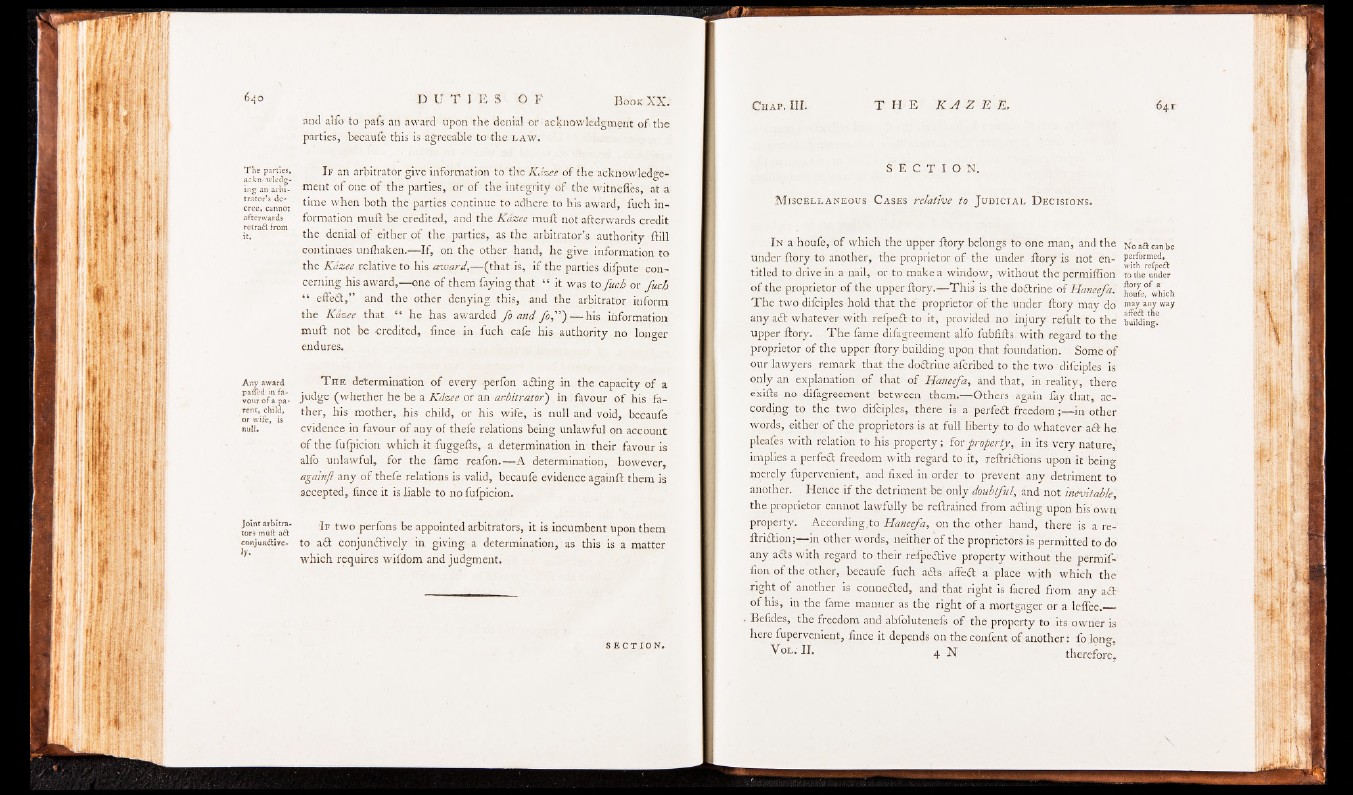
The parties,
acknowledging
an arbitrator’s
decree,
cannot
afterwards
retraft from
it.
Any award
paged in favour
of a pa*
rent, child,
or wife, is
null.
Joint arbitrators
mult aft
conjunftive- If
and alfo to pafs an award upon the denial o r ; acknowledgment o f the
parties, becaufe this is agreeable to the l a w .
If an arbitrator give information to the Kâzee 0 # of the acknowledtg>ement
of one of the parties, or of the integrity of the witnefifes, at a
time when both the parties continue to adhere to his award, fuch information
muft be credited, and the Kâzee muft not afterwards credit
the denial of either of the parties, as the arbitrator’s authority Bill
continues unfhaken.— If, on the other hand, he give information to
the Kâzee relative to his a w a r d ,that is, if the parties dilpute concerning
his award,— one of them faying that “ it was to fuch or fuch
“ effedt,” and the other denying this, and the arbitrator inform
the Kâzee that “ he has awarded fo and fo ,” ) — his information
muft not be credited, lince in fuch cafe his authority no longer
endures.
T he determination of every perfcn adting in the capacity of a
judge (whether he be a Kazee or an arbitrator) , in favour of his father,
his mother, his child, or his wife, is null and void, becaufe
evidence in favour of any of thefe relations being unlawful on account
of the fufpicion which itfuggefts, a determination in their favour is
alfo unlawful, for the fame reafon.— A determination, however,
againft any of thefe relations is valid, becaufe evidence againft them is
accepted, fince it is liable to no fufpicion.
If two perfons be appointed arbitrators, it is incumbent upon them
to adt conjunctively in giving a determination, as this is a matter
which requires wifdom and judgment.
S E C T I ON.
S E C T I O N .
M i s c e l l a n e o u s C a s e s relative to J u d i c i a l D e c i s i o n s .
In a houfe, of which the upper ftory belongs to one man, and the
under ftory to another, the proprietor of the under ftory is not eft-
titled to drive in a nail, or to make a window, without the permifSon
of the proprietor of the upper ftory.— This is the dodtrine of Haneefai
The two difciples hold that the' proprietor of the under ftory may do
any adt whatever with refpedt to it, provided no injury refult to the
upper ftory. The fame difagreement alfo fubiifts. with regard to the
proprietor of the upper ftory building upon that foundation. Some of
our lawyers remark that the dodtrine afcribed to the two difciples is'
only an explanation of that of Haneefai and that, in reality, there
exifts no difagreement between them.— Others again fay that, according
to the two difciples, there is a perfedt freedom;— in other
words, either o f the proprietors is at full liberty to do whatever adt he
pleafes with relation to his property; for property, in its Very nature,
implies a perfedt freedom with regard to it, reftridtions upon it beino-
merely fupervenient, and fixed in order to prevent any detriment to
another. Hence if the detriment be only doubtful, and not inevitable
the proprietor cannot lawfully be reftrained frpm adting. upon his’own
property. According,to Haneefa, on the other hand, there is a re-
ftridtion;— in other words, neither of the proprietors is permitted to do
any adts with regard to: their relpedtive property without the permife
fion of the other, becaufe fuch adts affedt a place with which the:
right of another is connedted, and that right is facred from any adt'
of his, in the fame manner as the right of a mortgager or a leffee._
Befides, the freedom and abfolutenefs of the property to its owner is
here fupervenient, fince it depends on theconfent of another: folong,
II. 4 N . therefore.
No aft can be
performed,
with refpeft:
to the under
ftory of a
houfe, which
may any way
affeft the
building.